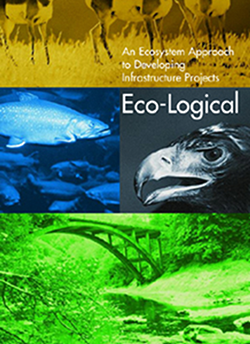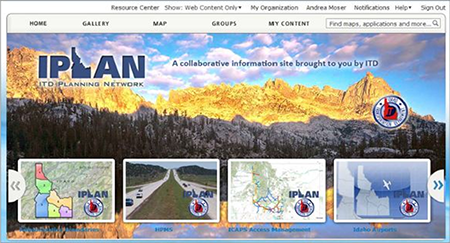
Implementing Eco-Logical:
Activities to Advance Ecosystem-Scale Transportation Planning
In today’s economic climate, transportation agencies across the country are trying to reduce costs and accelerate project delivery while avoiding environmental impacts and supporting ecosystem health. Through the Eco-Logical Program, the Federal Highway Administration (FHWA) is working with its partners to integrate ecosystem-level environmental considerations into transportation planning to help streamline the environmental review and permitting processes and to produce transportation and infrastructure projects that meet both mobility and environmental objectives.

Eco-Logical articulates a vision for an infrastructure development process that endorses ecosystem-based mitigation by implementing plans and data across agency and disciplinary boundaries. (Courtesy of FHWA)
In 2006, FHWA, seven other Federal agencies, and four State Departments of Transportation (DOT) recognized the potential benefits of integrating transportation planning with ecosystem considerations and jointly published Eco-Logical: An Ecosystem Approach to Developing Infrastructure Projects (Eco-Logical). The report outlines the Eco-Logical approach, an eight-step process designed to help transportation, resource, and regulatory agencies integrate their infrastructure planning processes and arrive at a joint set of environmental priorities. FHWA highlighted the report in the March 2006 issue of Successes in Stewardship. Following the publication of Eco-Logical, FHWA launched its Eco-Logical Program to test applications of the Eco-Logical approach and to develop strategies to increase awareness and adoption of the approach among State DOTs, Metropolitan Planning Organizations (MPOs), and other transportation, resource, and regulatory agencies. More information about FHWA’s Eco-Logical Program is available at the Eco-Logical web page.
Eco-Logical and the Second Strategic Highway Research Program (SHRP2)
To further support the Eco-Logical Program, FHWA requested that SHRP2 develop mechanisms for transportation agencies to incorporate the Eco-Logical approach into their normal business practices. SHRP2 is a national partnership between FHWA, the American Association of State Highway and Transportation Officials (AASHTO), and the Transportation Research Board that conducts research and deploys products known as SHRP2 Solutions, which advance innovative methods in the areas of safety, renewal, reliability, and capacity on the Nation’s highway system. In response to FHWA’s request, SHRP2 researchers developed a set of tools and processes that have been introduced to the transportation and environmental communities as the SHRP2 Solution, Implementing Eco-Logical. One key component of Implementing Eco-Logical is a nine-step process known as the Integrated Ecological Framework (IEF), which helps transportation practitioners to incorporate natural resources into the early stages of the transportation planning process to avoid or minimize environmental impacts and work with resource and regulatory agency partners to identify joint priorities. While SHRP2 emphasized the use of “crediting strategies” by including a separate step in the IEF, the nine steps closely mirror the original eight steps identified by the FHWA and its partner agencies. Benefits of the IEF and Implementing Eco-Logical include expedited environmental reviews, permitting, and project delivery; reduced project costs; more effective environmental mitigation; and improved public perception of transportation project delivery.
Putting Implementing Eco-Logical Into Practice
In September 2012, a panel of experts representing State DOTs, MPOs, Federal resource and regulatory agencies, and other stakeholders developed the Implementing Eco-Logical Implementation Plan as part of the SHRP2 Implementation Planning Workshop. The plan’s goal is to increase awareness and understanding of Eco-Logical principles and to incorporate them into routine transportation, resource, and regulatory agency business practices by Fiscal Year 2023.
The Implementing Eco-Logical Implementation Plan includes a number of recommended strategies to achieve these goals. In accordance with the plan, FHWA and AASHTO will oversee and manage six strategies, including:
- Developing incentives and support for the adoption of the Eco-Logical approach;
- Engaging transportation agency leadership;
- Creating new tools and technologies that facilitate the Eco-Logical approach;
- Providing technical assistance to educate staff-level practitioners;
- Publishing a business case study highlighting Implementing Eco-Logical’s time and cost savings; and
- Developing outreach materials to increase awareness and understanding of Implementing Eco-Logical.
Lead Adopter Incentives support practitioners that have completed early steps of the Eco-Logical approach, including agencies with existing collaborative partnerships that have developed or used Eco-Logical planning tools, such as the Regional Ecosystem Framework. The funding recipients include:
- Atlanta Regional Commission
- Charlottesville-Albemarle MPO
- Idaho Transportation Department (ITD)
- Maine DOT
- Michigan DOT
- North Central Texas Council of Governments
- Pikes Peak Area Council of Governments
User Incentives support State DOTs and MPOs that have interest, though not necessarily prior experience, in adopting the Eco-Logical approach into their organizations. The funding recipients include:
- Association of Monterey Bay Area Governments
- California DOT
- ITD
- Missouri DOT
- New Hampshire DOT
- Ohio-Kentucky-Indiana Regional Council of Governments
- Southern California Association of Governments
The first three of these strategies are explored further below.
Incentivizing Adoption of the Eco-Logical Approach: Implementation Assistance Funding
To encourage the adoption of the Eco-Logical approach, FHWA offered funding assistance to support the adoption of Eco-Logical or similar methods. FHWA instituted a similar grant selection process during the initiation of the Eco-Logical Program in 2007, in which FHWA provided approximately $1.4 million in funding to State DOTs, MPOs, and other organizations to test the Eco-Logical approach. More information about these initial grant projects is available in the April 2010 issue of Successes in Stewardship.
In early 2013, FHWA solicited applications from State DOTs and MPOs for two different types of assistance: Lead Adopter Incentives and User Incentives. Following a grant selection process in the spring of 2013, FHWA distributed implementation funding to the State DOTs and MPOs listed in the sidebar to the right. These organizations will complete their Implementing Eco-Logical projects over the next few years. The funding recipients represent geographic diversity and demonstrate healthy partnerships with State and Federal resource agencies. The grants were awarded to demonstrate a variety of applications of the Eco-Logical approach, each with strong potential for replication. Brief descriptions of each Implementing Eco-Logical project are available on the FHWA Implementing Eco-Logical web page, and more detailed summaries of selected projects will be featured in a future issue of Successes in Stewardship.
Engaging Agency Leadership: Executive Training
As part of the implementation plan’s strategy to engage transportation agency leadership, AASHTO and FHWA will offer executive training to encourage transportation agency leadership to promote the adoption of Implementing Eco-Logical. AASHTO will lead a brief, high-level training session for agency leaders at its Annual Meeting in October 2013. Increasing awareness and support of the Eco-Logical approach among State DOT and MPO leadership is an important first step to future implementation activities.
Creating New Tools and Technology: Survey, Practitioner Handbook, and Starter Kit
In addition to promoting Implementing Eco-Logical at the leadership level, AASHTO will administer a self-assessment survey to environmental planners at State DOTs and MPOs in the coming months to assess the agencies’ readiness to implement the Eco-Logical framework. The survey results will inform future training and technical assistance, as AASHTO and FHWA look to develop materials and deliver workshops and peer exchanges that assist transportation agencies with Implementing Eco-Logical. FHWA will conduct parallel outreach with the Federal resource and regulatory agencies as well as with the FHWA Divisions.

ITD is using implementation assistance funding to to improve IPLAN, a web-based cloud portal that will help the Agency save time and money during highway planning and protect the ecology along the State’s corridors. (Courtesy of ITD)
The survey results will inform the development of two technical assistance resources for staff-level practitioners:
- An Implementing Eco-Logical Practitioner Handbook will summarize the content of the Implementing Eco-Logical research products and provide guidance to State DOTs and MPOs adopting the Eco-Logical approach.
- The Implementing Eco-Logical Starter Kit will contain resources to assist State DOTs and MPOs in the early steps of integrated planning. The starter kit may include training materials, best practices, and additional resources.
AASHTO plans to complete both products in early 2014. Both the starter kit and practitioner handbook will be available on the FHWA Implementing Eco-Logical web page.
Looking Ahead for Eco-Logical
With several strategies already underway, FHWA and AASHTO will continue to work toward the execution of Implementing Eco-Logical throughout 2013 and 2014. The FHWA Implementing Eco-Logical web page will be updated as FHWA and AASHTO develop new resources for practitioners of Eco-Logical, such as implementation workshops, peer exchanges, case studies, and on-call technical assistance. Existing and upcoming training, outreach materials, and other Eco-Logical content will address the needs identified in the self-assessment survey and document the challenges faced by transportation agencies that were early adopters of the Eco-Logical approach.
Ultimately, these resources will allow FHWA and its partners to achieve their goals of increasing awareness of Implementing Eco-Logical; integrating Eco-Logical principles into transportation, resource, and regulatory agency business practices; and producing time and cost savings and improved environmental outcomes through implementation of the Eco-Logical approach.
Contact Information
Michael Lamprecht
Office of Project Development and Environmental Review
Federal Highway Administration
(202) 366-6454
michael.lamprecht@dot.gov
Kate Kurgan
Senior Program Manager for Environment
AASHTO
(202) 624-3635
kkurgan@aashto.org
Look What’s New!
- FHWA has recently updated its Congestion Mitigation and Air Quality (CMAQ) Improvement Program website. It provides basic background on CMAQ and emphasizes that the program offers funding for transportation programs that improve air quality and reduce congestion. The updated content highlights changes to CMAQ under the Moving Ahead for Progress in the 21st Century Act, among other important topics.
Successes in Stewardship is a Federal Highway Administration newsletter highlighting current environmental streamlining and stewardship practices from around the country. Click here to subscribe to the newsletter, or call 617-494-2092 for more information.

